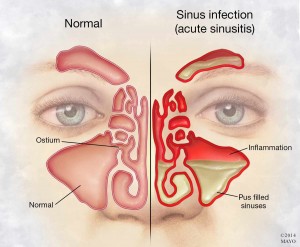-
Treating Sinus Infections Without Antibiotics
Tomah, WI - People often want antibiotics to tackle a sinus infection but that might not be the best treatment since most infections are caused by viruses. Antibiotics fight bacteria, not viruses.
might not be the best treatment since most infections are caused by viruses. Antibiotics fight bacteria, not viruses.
There are also complications that can develop with dependency on these drugs. The more antibiotics are used the less effective they can become, with possible side effects like dizziness, stomach problems and rashes.
Instead of turning to antibiotics, Alan Conway, M.D., family physician at Mayo Clinic Health System – Franciscan Healthcare in Tomah, suggests some alternative methods of treatment. Dr. Conway says, “First of all, you should give yourself enough rest. Your body needs the time to fight the infection with full force, especially in the first few days when symptoms are the most severe.”
- Dr. Conway suggests drinking warm beverages to help loosen and drain mucus build up. Warm water and tea are among the most popular and effective choices.
- Don’t forget to take breaks to breathe in warm, moist air from a shower or kettle steam. These will also have a similar effect as the warm beverages in fighting mucus buildup.
- Dr. Conway recommends lying with a pillow propped behind your head to help prevent post-nasal drip reaching the back of the throat.
- Drinking warm water mixed with a half of a teaspoon of salt to soothe the throat.
- You may want to consider rinsing your nose with salt water sprays or nasal irrigation kits, these often provide nasal relief. Be sure to follow the directions.
Dr. Conway also says. “Watch out for over-the-counter products that contain oxymetazoline. These products may relieve symptoms for a few days, but they can cause congestion if used longer than three days. Instead, use generic pseudoephedrine pills if you are stuffed up for more than three days.”
Sinus infections can turn into a bacterial infection, due to the prolonged blockage in the sinus cavity. It is not easy to determine whether the infection is viral or bacterial, considering that the symptoms are the same for both. Even if the infection becomes bacterial, 70% of the time the infection will go away within two weeks without antibiotics.
In the event of severe headache, toothache, or face pain or for persisting fevers greater than 102 degrees you should be seen by your health care provider.
# # #
Mayo Clinic Health System consists of clinics, hospitals and other health care facilities that serve the health care needs of people in 70 communities in Georgia, Iowa, Minnesota and Wisconsin. The community-based providers, paired with the resources and expertise of Mayo Clinic, enable patients in the region to receive the highest-quality health care close to home.







